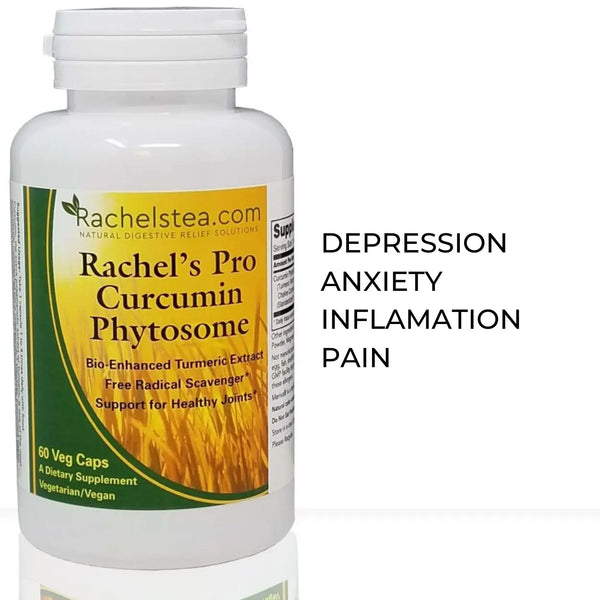

4 Slippery Elm, 1 Rachel's Pro Turmeric Blend & 1 Rachel's PRO 100

Rachel's Pro Turmeric Blend (2 Pack)

Rachel's Pro Turmeric Blend (4 Pack)
I'm having a flare up, and my weight is already too low, what now?
Good Question !!
Since most people need to lose weight, and consider loosing weight while following a health plan like Pain Free Foods; Catalyst Food Avoidance, weight loss is considered a benefit. If you and your doctor feel your weight is already low or very low. The thought of an eating plan or a 48 to72 hour liquid diet (our recommendation for times of flare-ups and attacks) is not fun.
The truth is that good advice on maintaining weight or gaining weight when you have a digestive disorder is very hard to come by. Because we have coached over 100,000 clients, this topic has come to us hundreds of times and I believe our advice on this subject is “spot on” however if your weight is dangerously low, do always ask your doctor.
To put you in the proper frame of mind to accept this advice, you first need to understand why your weight is below where you want it. Let’s start with the main reasons a person weighs less than they “should” in a country where obesity is epidemic.
Here are some reasons for being under weight:
- There are three main body types. For this article, the only one that matters regarding this article is “endomorph” which is the slender, lighter weight, body type of the three. Endomorphs lose weight easily and have a hard time gaining weight even under ideal conditions.
- Illness
Illness is a main reason for unusual weight loss and for many, their digestive disorder is the actual reason, they have lost weight - Malnutrition.
Malnutrition can be due to a damaged digestive tract or lack of eating a balanced diet.
The three main causes (above) of inability to gain weight include malnutrition. Since malnutrition means that your body is not getting enough calories, vitamins, minerals, enzymes, fats, carbohydrates, or proteins, the solution seems simple..
However there is still a question:
- Is your malnutrition due to lack of absorption; such as that caused by an inflamed or infected intestine? This can mean that regardless of how much or how well you eat, you do not gain weight.
- Is your malnutrition due to inability to eat or fear of eating, due to fear of eating. This type of malnutrition is often learned behavior from pain, bloating, cramping, diarrhea, constipation, etc. which occurs after eating.
Factors such as inflamed intestines, mucosal lining damage, or beneficial intestinal bacteria imbalance can all cause painful symptoms when eating. It is natural for people to eat less and less, and to eat a narrower and narrower variety of foods over time to avoid the discomfort. This is often what leads to weight loss.
Here are the things that are probably happening to you (one or more of these).
- You are an endomorph and have lost even more weight as your digestive disorder progressed.
- You may be a high stress “worrier” type with a high metabolism. This coupled with a digestive disorder equals ongoing weight loss.
- You have learned the few foods or meals that don’t cause you discomfort or bathroom drama and now you stick to those few foods. This may cause a lack of volume at mealtime, and a lack of overall nutrition and calories to maintain your weight.
If you look at all the factors in this article, do your best to decide which of the causes is most closely related to your weight loss or inability to gain weight back. The overall, best “fix” for most people is to follow the higher calorie recipes in the Catalyst Food Avoidance plan (this plan is available free on this site). These meals are non acid forming and great tasting.
Other options include supplementation. Choose your supplement by looking at your specific cause. For instance if you have gone through some traumatic levels of stress like the loss of a loved one or loss of a job, financial problems etc. The mood altering supplement Rachel’s Turmeric Extract (or equivalent found locally) is great. This supplement is for long term use only or it won’t work.
Another option is Rachel’s Digestive Relief Tea which also includes a very large dose of turmeric in every cup. The tea is also designed to address mucosal lining damage to the stomach and intestines, mood calming, and inflammation reduction.
There are two good sections in the Pain Free Foods books, the first on gaining weight and the second on our flare-up protocol. This protocol includes a 48 hour or so liquid diet, during which you may loose another couple of pounds (not what you wanted to hear right) but this weight loss is temporary and leads, in most cases, to being able to begin slowly regaining lost weight due normalizing your nutrition absorption.
Featured Articles

Supplements, diet, or a combination of both for digestive relief?

Catalyst Foods Explained

How does tea help a digestive problem?
Join our online Community
Join thousands of people that used to be searching for answers about digestion just like you were. Our private group is a secure place to find the answers you're looking for from real people and coaches.
Join Us
4 Slippery Elm, 1 Rachel's Pro Turmeric Blend & 1 Rachel's PRO 100

Rachel's Pro Turmeric Blend (2 Pack)



